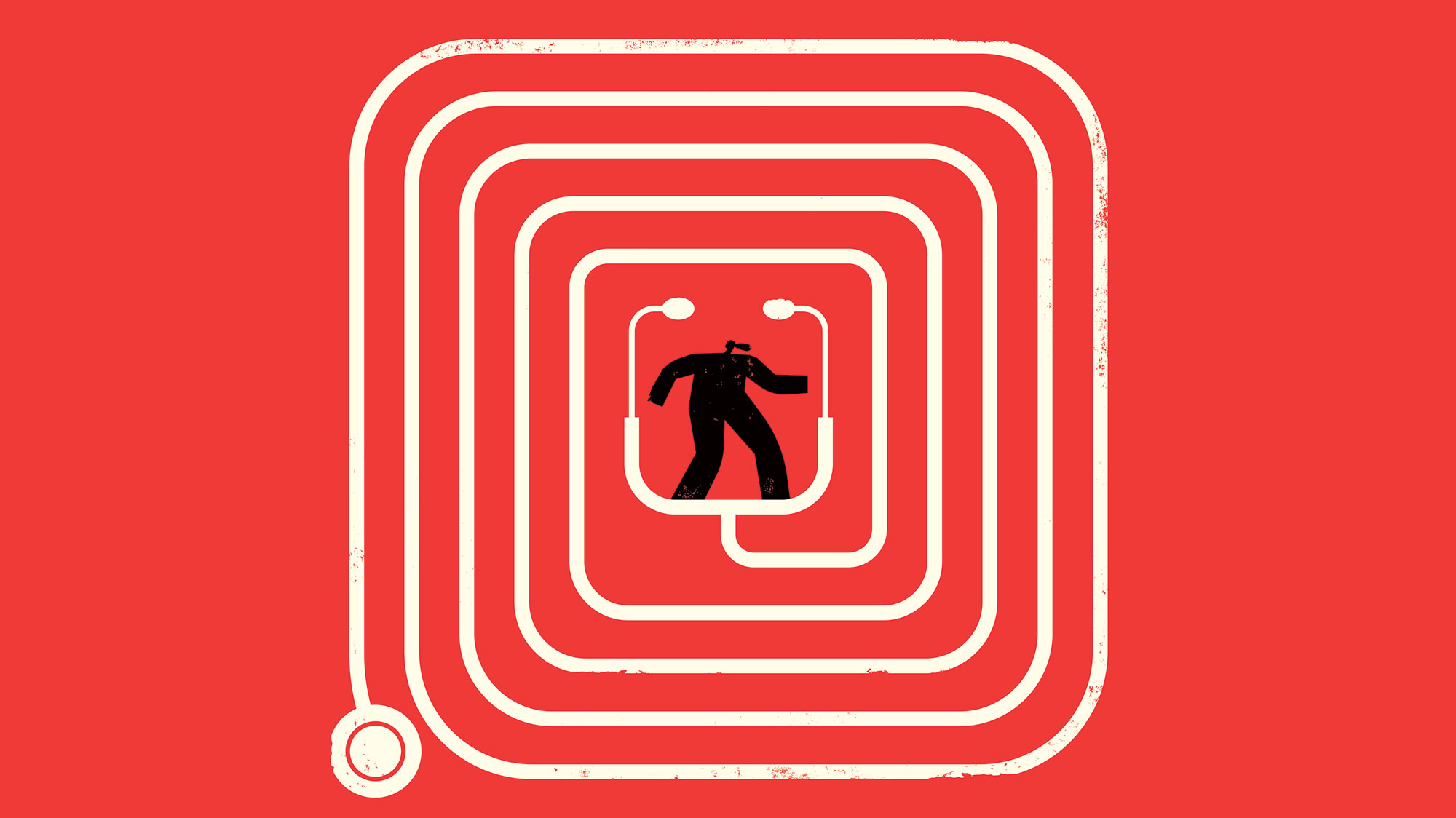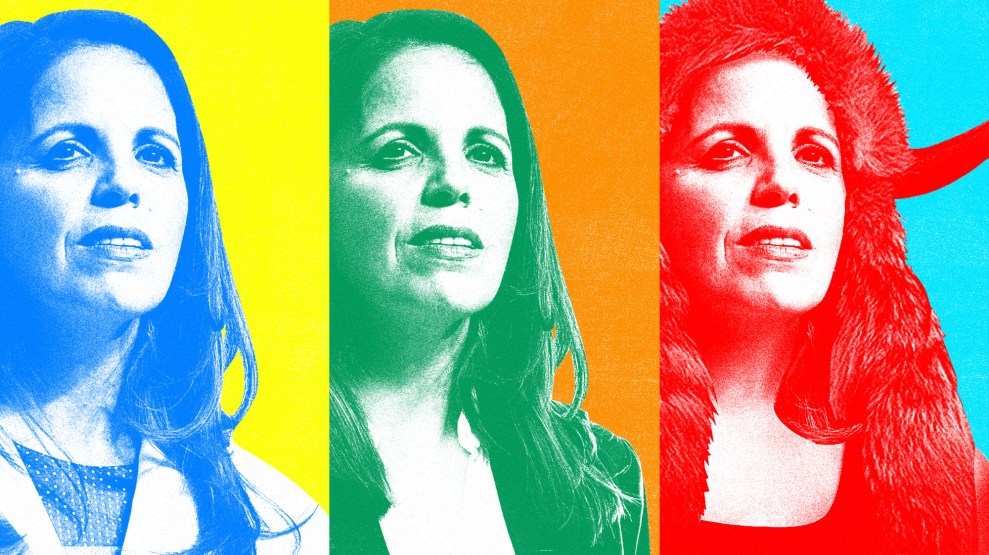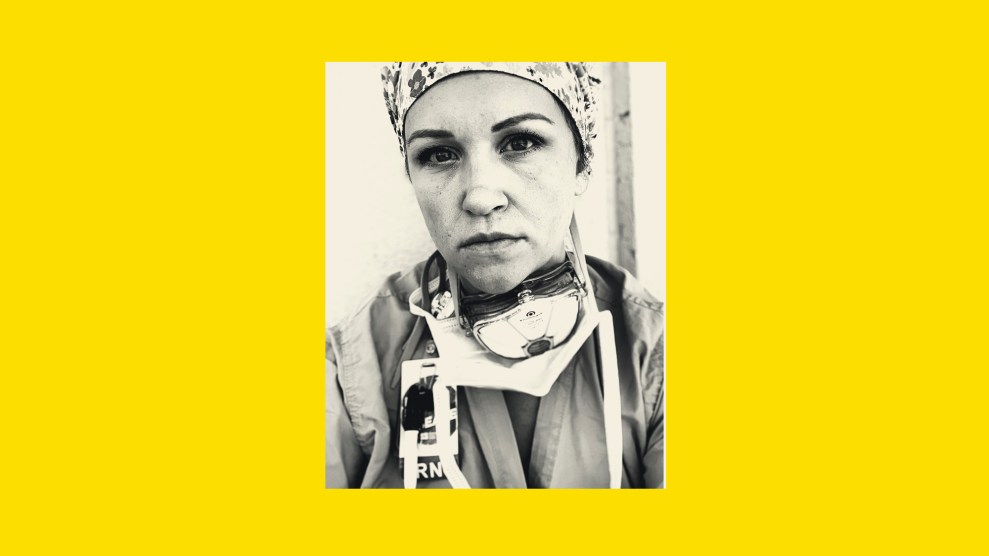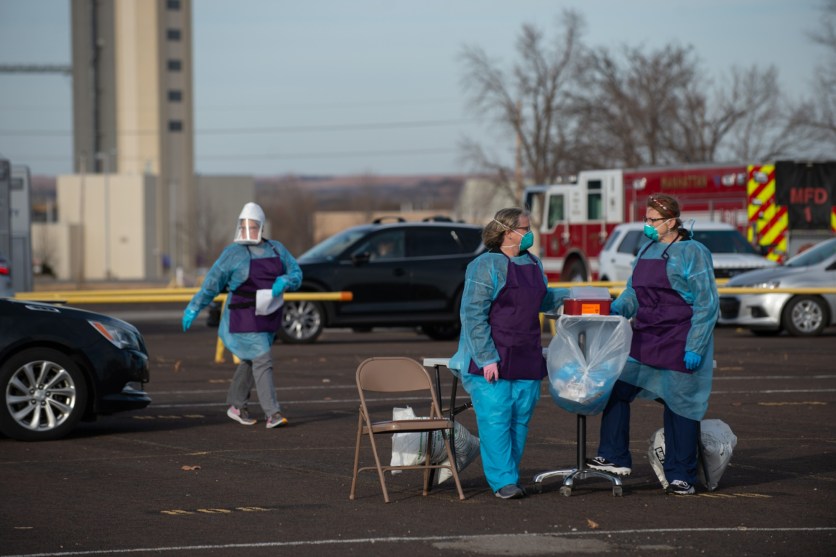In our January + February 2022 cover story, we attempted to answer a simple question: What the hell happened to labor since the pandemic began? It wasn’t one thing. But this package—through a series of worker stories as told in their own voices, interviews with experts, and dissections of media narratives—attempts to make sense of the moment. You can find the full package here.

The nurse in this story spent most of the pandemic working in a Texas Covid ICU run by a for-profit hospital company. She asked to remain anonymous to protect her from potential retaliation.
I grew up in Texas and was always involved in athletics. An athletics scholarship allowed me to be the first person in my family to go to college. I studied what I was comfortable with: sport science. By the time I graduated, I realized it wasn’t fulfilling.
I had no long-term goals, so I decided to go overseas for a few years to continue pursuing my athletic potential. While I was there, I got really sick. I ended up needing a pretty major surgery, and I was in the ICU for a week. I didn’t have any way to get in touch with my family except through Skype, which I couldn’t do because I was so out of it. I only spoke like a 5-year-old level of the language.
There’s a lot I don’t remember because I was probably sedated, but I do remember one nurse who really went out of her way to try to communicate with me. She took great care of me. Right then and there, I knew I wanted to be a nurse. I moved back to Oklahoma and started prerequisites and got into nursing school as soon as I could. I’ve always worked in the ICU—six years. I really love being a nurse. It’s truly my calling.
I’ve seen all three waves of the pandemic. I started at my old hospital two years ago. I tried to pick a hospital that had good reviews, and this one did. They had a $20K signing bonus. Usually, a big signing bonus means you’re walking into a shitshow because they want to be able to retain you. Twenty-seven dollars an hour was our base pay.
I learned right away that they spare every expense. It seemed like they were saving money by putting everything on the bedside nurse. I charged in one of three ICU units that are like sister units. As a charge nurse, I don’t get paid anything extra. At this hospital, it was our responsibility to do the staffing numbers for the next shift, to make sure there’s enough staff. But there never was.
I was in Covid 75 percent of the time, maybe 80. The units have 13 beds. A nurse will have one or two patients—one if they’re supercritical. Very rarely, someone may get tripled. To be properly staffed, we really need seven to eight nurses on the unit. But we’ve been running at five.
It’s just been hard. There are medications called “drips” that run continuously to keep our patients’ blood pressures in an appropriate range. There are medications we need to give to keep them sedated if they’re on the ventilator. Especially with Covid, we have a challenge of keeping patients sedated enough. Their lungs are so noncompliant, you have to keep them heavily, heavily sedated.
If you keep that kind of medication on a patient, oftentimes their blood pressure will go down. Then you have to compensate with a blood pressure medication. They also have blood-clotting issues so they have to be on continuous anti-clotting medication. A lot of these patients are on seven drips. The drips are weight-based. We’re in South Texas, so most of our patients have the South Texas Special: hypertension, high cholesterol, diabetes, obesity. They’re just big. We run through these medications really quickly.
It’s very exhausting, just staying on top of the drips alone. But there are also all the other things that come with maintaining someone’s body when they are incapacitated. ICU is somewhere where, if you have a hole, we got a tube in it, or we can make a hole and put a tube in it. They’re on the ventilator. They have a feeding tube. Often they have one or more chest tubes. I’ve seen up to five. They have a catheter. They have a rectal tube. They have central lines. Patients, before all of this, would have been a one-to-one. Now we’re tripling those patients because we don’t have enough nurses.
In the first and second waves, all patient care—not just at this hospital—was relegated to the bedside nurses in the Covid ICU units. Doctors didn’t come into the room. We would give them our head-to-toe assessment. They would just take our word for it and write orders. We didn’t have EVS to come in and clean. We didn’t have lab to come and draw. We did all the physical occupational therapy. We were doing eight people’s jobs at once.
Standard ICU orientation is 12 weeks long—no shorter than eight. Even if you go from one facility to another, they give you six to eight. I was orienting our nurses for five weeks. There are things these nurses haven’t ever seen, especially nurses who went to nursing school during the pandemic and had a very limited clinical course. These new nurses were just shocked. The first two weeks, I’m just, “Watch what I do. I’m here to answer any questions.” We go from there but that’s already halfway into their orientation.
I’ve had two orientees I’ve had to fight for one extra week for. The next week management said, “Okay, we’re going to change preceptors. We’re going to put this new nurse with a new preceptor and see if they can get them off orientation faster.”
If I see something that’s not right, I say it, but not everybody’s that way. If you’re a new nurse and your superior tells you to do something, you just say, “Yes, sir. Yes, ma’am.” You’re worried about losing your job. I feel like the hospital preys upon that. They’re typically more timid about asking for a raise. The poor staffing ratio is all they know. Not at all their fault, but I never felt comfortable going to lunch because usually I would have the most critical patients and be leading a group of nurses who hadn’t had this type of therapy before.
Here’s an example of what can happen if you take a nurse off orientation too soon: A nurse got a patient who came up from the ER intubated. He was on three blood pressure medications. An experienced nurse would have thought: What’s causing his blood pressure to be so low? Is he on any medication? No? Is he bleeding? But if you have an inexperienced nurse, all they’re doing is just replacing the drips, and they can’t be at the computer all the time to see orders. She didn’t know that the doctor had ordered an abdominal scan.
I was on a different unit that day and I heard a Code Blue overhead. I ran to her room. We coded this guy and he died. She ended up getting blamed for his loss because she didn’t take him down to get the scan. But in her defense, he was so unstable, he likely would have passed en route. It turns out he had an internal bleed that if they had been able to know what it was and where it was coming from, he could have gotten surgery.
I feel so bad for her because management really came down on her. She wasn’t fired, but she was encouraged to leave. She ended up going to another hospital that offered a 12-week orientation. Last time I talked to her, she was really happy there and things were starting to click for her.
One of my last shifts, we had five nurses. I was the charge. I had to triple two of the nurses. I had two patients of my own, and I was running a dialysis machine on another patient. We had a patient down the hall: 90 years old, had just gotten intubated; her oxygen was 55. We’d been asking for any physician to call family and talk about maybe making a DNR. They were all too busy putting out fires themselves. She coded.
So we ran in there, and we got her back. We called the family to let them know. Any healthy 90-year-old wouldn’t have a good prognosis. But on top of that, with Covid, she was a smoker and had other issues. At this point, it’s just prolonging suffering. You’re literally cracking somebody’s ribs when you do CPR. They’re naked in the room. It’s not like it is in the movies.
The patient’s family hung up. We have a no-visitor policy in the unit because of Covid. I don’t know how the daughter got through security. She came up all the way to the unit—no mask—and demanded to speak to the charge nurse about why she couldn’t be in the room with her mother.
It’s a fair question. Nobody should have to die alone, and she’s not wrong about that. But at the same time, this family member also had Covid. We all knew the whole family had Covid. None of them were vaccinated. Then she comes in without a mask.
It takes a lot of strength, especially at the end of the shift, to be professional at that point. I told her, “I’m so sorry, ma’am. I understand. No, your mother shouldn’t have to pass alone. I can put a tablet in the room. But, unfortunately, I have to ask you to leave. Please, put on this mask.” I tried to give it to her. She knocked it out of my hand, called me a bitch, and said this was all a fucking conspiracy. I paged the unit and told everybody, “Stay away from the front desk if you can.” Then I called security, and she was escorted out.
That’s not how I would have wanted it to be. At that point, you have to think of safety over dignity. I had never thought about that. At every other point in my nursing career, I’ve never kept anybody from family when they’re passing. It’s always been about making sure, whatever they believe in, they feel okay about the process.
The circumstances surrounding this pandemic, especially this wave, where many of these deaths could have been prevented, are heartbreaking. We’ve had several people in the Covid ICU say, “I really wish I would have gotten the vaccine.” I feel bad for those people because a lot of them had intended to get it, but they just put it off. We’ve had people who thought they’d have more time to think about it.
When I can, I try to be in the room with the patient as they pass. I try to call family on Zoom. There are ways that you can arrange for a family member to be there, but there is also a route to do that, and that route is not coming up to the nurse’s station without a mask and cussing someone out.
Now, it’s like every third one asks about Ivermectin. I had one today. We had just intubated her mom overnight. She said, “How long is she going to be intubated?” I said, “Well, it could be months.” I went into how it all works. She said, “Well, what about the medication you’re giving her? Is that going to help her?”
I said, “What medication?”
She’s like, “Aren’t you giving ivermectin?”
I said, “No, ma’am. There’s currently no evidence to support its use.” It gets brought up all the time.
One of our managers just wasn’t doing his job. He stayed in his office and the pandemic happened. He got fired because he was just kind of worthless. The second one was a little sneakier. He was hired in October. He was fairly knowledgeable. He was younger, early 30s. I quickly started to notice that the nurses being hired were fairly attractive. There’s nothing wrong with that, but he started making comments to several of us.
He’d never say things in front of other people, and you couldn’t really distinguish whether he was joking. The only time I would go by the old manager’s office was to get candy. After he left, this other guy took his office. I would go in there to get candy, but the candy bowl was always empty. I was like, “Where’s the candy?” He was like, “The only snack in this office is me.”
I’m sure you’ve heard my son in the background. I’m too old for that shit. I’m 33. I jokingly said, “Eww,” and walked away, because I’m like, maybe he’s kidding. Then he came up to me later. He said, “Was it really ‘eww’?” He wanted me to break it down for him. I was like, “Yes, actually, eww.”
In February, I found out I was pregnant. The baby had a lot of problems. The bloodwork showed she had congenital issues. I had to go see a specialist. They only had certain days I could come in so I had to get coverage for my shift so I could go get scans checked out. I asked him if he knew anybody who could take my shift. Right away he filled the spot. I was really grateful that I didn’t have to stress about that or take a hit to my record.
We found out we were going to lose her. I had to schedule for a week and a half after that so I could deliver. I had to find more coverage. I texted him and asked if he could help. Insurance wasn’t going to cover me for short-term disability, so I scheduled the procedure for midweek. Then I stacked my week to work at the very beginning of one week. Then I had a long split and didn’t have to return until the next Thursday.
The week before the procedure, I was a walking tomb basically. He came up to me and put his hand on my stomach and was like, “Do you like how quickly I found coverage for you and the baby?” It felt creepy. It was creepy. I didn’t say anything to anyone about it because it felt like something that could easily be explained away, and I was questioning my own emotions at the time—losing a child and managing everything and trying to find a cremator, and blah, blah, blah.
He knew what was happening with the pregnancy. I’m pretty open. I’m in therapy for PTSD from the first wave. And he had helped me get coverage for when I needed the delivery and all that. But I didn’t say anything. I tried not to think about it. I tried to block it out. When I came back to work, all these other things came to light. He had been sleeping with three of the new nurses he hired and had also been sleeping with another nurse who’d only been a nurse for a year.
There was a point in May where there were a couple of us who kind of knew it was going on but didn’t feel safe to tell anybody. At that point, there was one Covid unit. He was the manager for three units. He was picking favorites and sending his least favorite people to Covid. He was basically punishing people if they said that they would go forth and say something or if they challenged him in any way.
It was probably early June when we started asking for raises. We were asking just for anything at that point. We didn’t tell him we needed a raise to keep working with him. I think he tried to push through a raise for everyone. Then he got fired and we had interim management come in early July.
The interim manager was covering five units at once and didn’t know any of us. For most of the other units in the hospital, their charge nurses automatically get a $1-an-hour incentive. For whatever reason, our unit doesn’t qualify. I guess this interim manager assumed we already had extra money. Most of the other nurses, some of whom had just recently been hired, got a $2 to $5 bonus. But charge nurses didn’t. We’re in charge of these nurses who have six months of experience. I’m not saying they didn’t deserve that raise. They absolutely did. But it was very unfair.
We weren’t feeling appreciated. Definitely not compensated. After I got called a bitch by an unmasked family member who had Covid and didn’t get a raise, I thought, you know what, if I have to work with these patients anyway, I need to be paid for it because right now I am losing it.
We had traveling nurses coming in. You talk to them and find out they’re making $100 per hour. I found out that some of them stayed local. I started putting in applications to be a contract nurse. All the while, I was talking with other charge nurses, and we were all thinking the same thing. I guess it was maybe the third week in August when all of us came to the same conclusion: It was time to go.
When we put in our two weeks, we did try to bargain with our bosses. We didn’t want to leave per se, now that our previous boss was gone. All of us felt guilty for leaving, and it’s hard to transition to another job. We didn’t necessarily want to leave just for the money, but it was a slap in the face that we didn’t get the bonus that everybody else did.
I asked for $50 an hour. They said that’s too much. Then I asked for $40. They said that’s too much. They didn’t budge at all. I might’ve even stayed for a retention bonus. We also tried asking for less responsibility. They said that wasn’t possible. They said these things have to get done and there’s nobody else to do it. It was like, okay, we’ll force your hand and see who’s going to do it when all of us are gone.
We were over two of the five Covid units. Now the unit is left with even fewer nurses and no leadership because the interim director doesn’t know anybody. It’s not safe. It wasn’t safe before with only one experienced nurse per shift. But even though all these issues were out of my control, there’s a feeling that I’m leaving people behind.
I’m at a Covid ICU at a hospital just down the street. I get $90 an hour, then $1,200 a week for living and food expenses. My goal is to save everything, go back to school, get a higher degree, and keep working in the medical field. I’m working just as hard now, but I don’t have anywhere near the mental load. I haven’t had to go to any codes. I don’t have to worry about staffing. All that stress is gone. I just get to worry about my patients.
This story is part of our Bad Bosses project, a reported collection of accounts from workers about their terrible bosses and the system that creates them. You can read more about the entire project and find every story here. Annotations—highlighted throughout—can be clicked for further context and comment from other parties. Got your own bad boss story? Send us an email.
















